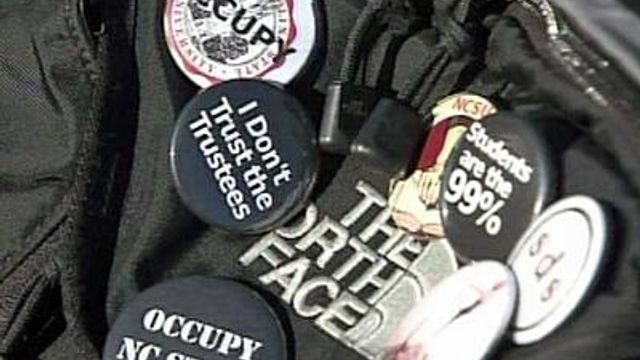NC State finds teaching opportunity in 'Occupy' protests
Professors and staff at North Carolina State University on Thursday planned a day-long "teach-in" on campus and at the state Capitol that's focused on the anti-Wall Street "Occupy" protests
Posted — UpdatedOrganizers say it's not a rally or a protest but a series of lectures ranging from the causes and consequences of economic inequality to free speech.
"You can learn both positively and negatively from the past, what worked and what didn't work," said David Zonderman, a history professor who spoke on lessons learned from past mass movements.
"They're already doing some of the positive things that past movements have done," he continued. "It's a true grassroots movement. It's very broad-based," he added. "It's very accepting of people of all walks of life, which I think is important for a successful movement."
Professors and staff from a range of disciplines, including history, communication, sociology and English participated in the event until 2 p.m., and then, with students, marched about 2 miles to the Capitol.
There, professors from Duke University, the University of North Carolina at Chapel Hill and the University of North Carolina at Greensboro will also host a series of lectures on the movement and what it means in the broader perspective.
"(Students)" are really the core of the movement itself," said Steve McDonald, a N.C. State sociology professor.
He said young people are especially vulnerable to the growing gap of financial inequality. Approximately two dozen students sat in on the lectures at any given time.
"No matter how much you study something, there's always more to learn," N.C. State graduate student Michelle Lore said. "I definitely wanted to come out and support the movement and give it as much possibility as possible."
The Occupy movement started in New York City on Sept. 17 with a handful of demonstrators protesting on Wall Street.
By Oct. 9, it had spread to cities and towns across the country and then to other countries. Rallies have been held in more than 900 cities worldwide, including Raleigh.
Zonderman said he doesn't believe visibility is an issue, not yet at least.
"I think that if the movement doesn't sort of organize around a couple of key issues, they run the risk of either people losing energy or other people looking, saying, 'We don't know what you stand for, so why should we help you?'" Zonderman said.
"Are they going to develop a real platform or not?" he added. And what are they going to about getting involved in politics, if they are at all?"
• Credits
Copyright 2024 by Capitol Broadcasting Company. All rights reserved. This material may not be published, broadcast, rewritten or redistributed.






